We asked respondents whether they approve or disapprove of how U.S. President Joe Biden is dealing with five major international concerns.
- Global publics are divided over Biden’s handling of climate change and global economic problems.
- A 34-country median of about four-in-ten approve of how he is dealing with China.
- A median of 39% approve of how Biden is dealing with the Russia-Ukraine war, but Europeans generally see this as where the U.S. president is doing best.
- Biden gets his lowest marks for his handling of the Israel-Hamas war. A median of 31% across the 34 countries surveyed approve of how he is dealing with the conflict.
Adults in some countries, including Kenya, Poland and Thailand, hold more positive assessments of how Biden has handled these five concerns. On the other hand, people in Tunisia and Turkey rate Biden extremely negatively on these issues. Biden also receives low approval ratings in these areas from Chileans, Greeks, Italians and Malaysians.
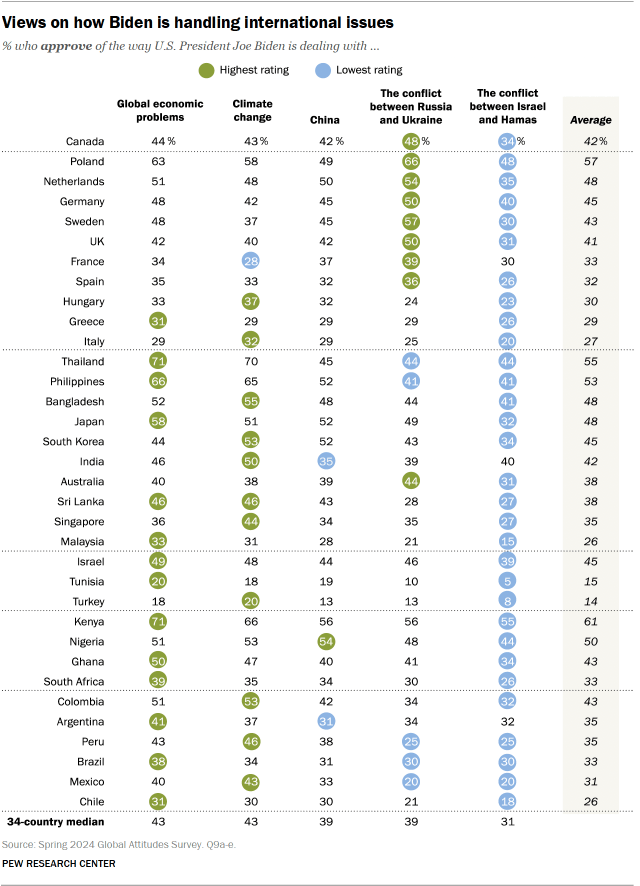
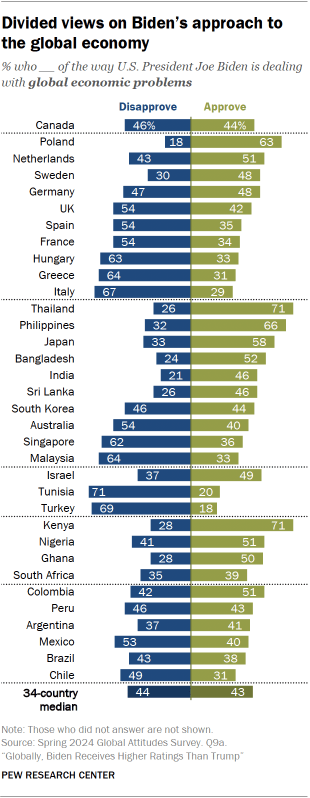
Views of how Biden is dealing with each issue strongly relate to confidence in Biden overall. People who approve of how he has handled global economic problems, climate change, China, the war in Ukraine or the Israel-Hamas war are all more likely to have confidence in the U.S. president.
Biden’s handling of global economic problems
Publics are about equally as likely to rate Biden positively on global economic policy as they are to rate him negatively. A 34-country median of 43% approve of how he is dealing with international economic issues, while a median of 44% disapprove.
Support is much higher in some nations: For example, 71% approve of his approach in Kenya and Thailand, and more than six-in-ten say the same in the Philippines and Poland.
But similarly high shares say they disapprove of how Biden is handling this issue in Tunisia (71%), Turkey (69%), Italy (67%), Greece (64%), Malaysia (64%) and Hungary (63%).
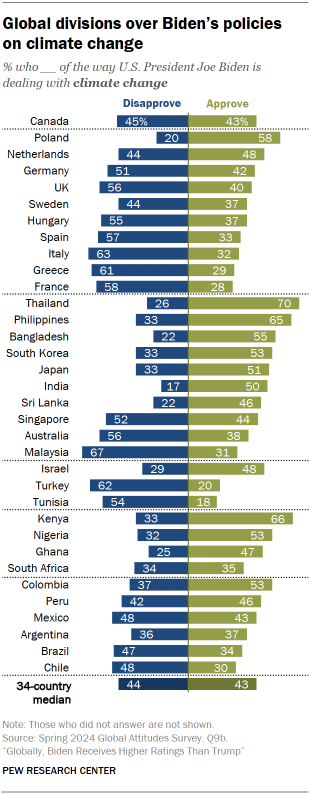
Biden’s handling of climate change
Biden has made action on climate change a key priority throughout his presidency, rejoining the Paris Agreement in 2021 and signing the Inflation Reduction Act into law in 2022, which included several provisions designed to address climate change.
But publics are divided on his climate policy: A median of 43% say they approve of his approach, and a median of 44% say they disapprove.
Support for the way Biden is dealing with climate change is highest in Thailand, where seven-in-ten approve of his approach. Thailand is ranked ninth in the world for long-term climate risk and is expected to submit its first-ever climate change bill this summer.
In contrast, Biden receives his lowest approval ratings on climate change in Tunisia, where only 18% approve of how he is handling the issue. Still, Tunisians are not alone in their dissatisfaction: Fewer than three-in-ten adults approve in France, Greece and Turkey.
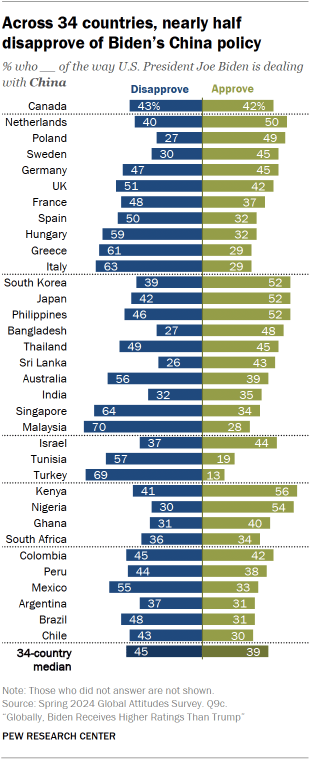
Biden’s handling of China
A median of 39% across the nations surveyed approve of Biden’s approach to China, while a median of 45% disapprove.
Ratings are highest in Kenya – the only country where a clear majority (56%) approve of Biden’s China policy. Still, there are other countries in Europe, sub-Saharan Africa and the Asia-Pacific region where half or more evaluate Biden positively on this issue.
Views vary especially widely across the Asia-Pacific region. Roughly half or more in Japan, the Philippines and South Korea approve of Biden’s dealings with China. But majorities in Australia, Malaysia and Singapore disapprove.
Turkey is the least likely to approve of Biden’s approach: Only 13% are content with the way he is dealing with China.
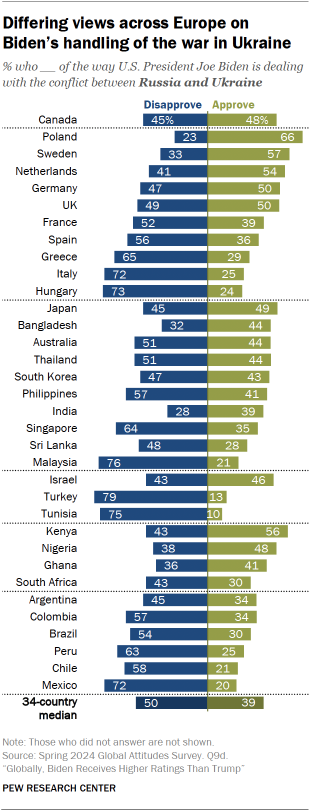
Biden’s handling of the Russia-Ukraine war
When asked to assess Biden’s handling of the war between Russia and Ukraine, a median of 39% across 34 countries say they approve. A larger share – a 50% median – say they disapprove of the way Biden is dealing with the situation.
Since the start of the war in February 2022, the Biden administration has imposed strict sanctions on Russia and provided over $100 billion in aid to Ukraine. Biden signed the most recent aid package on April 24 after months of delay in the U.S. Congress.
Biden receives the most support on this issue from select NATO member states.
Roughly two-thirds of Poles (66%) approve of the way Biden has been handling the war between Russia and Ukraine. Poland, which borders both parties to the conflict, has taken in close to 1 million Ukrainian refugees since the war broke out.
A majority share in Sweden – NATO’s newest member – also approve of Biden’s handling of the war (57%).
His handling of the conflict is least popular in Turkey, another member of the alliance. Roughly eight-in-ten Turkish adults disapprove of the way Biden is dealing with the war in Ukraine, while only 13% approve.
Hungary also stands out as a NATO nation where people strongly disapprove of Biden’s Ukraine policies (73%). In all, half or more disapprove of Biden’s dealing with the Russia-Ukraine conflict in six of the 12 NATO members surveyed.
Biden’s handling of the Israel-Hamas war
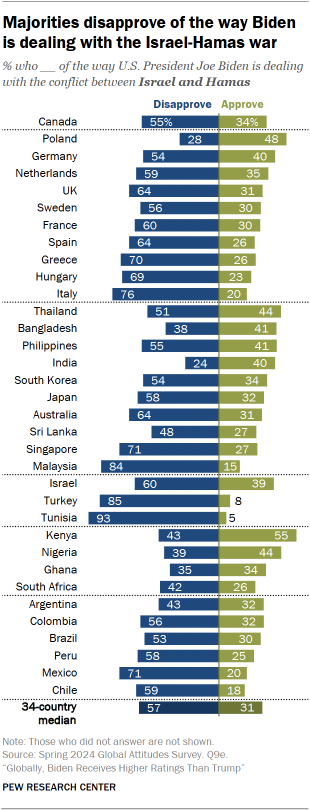
Of the five global issues we asked about, Biden receives his lowest ratings on the Israel-Hamas war: A median of 31% across the 34 countries surveyed say they approve of his handling of the conflict, while a median of 57% disapprove.
The Biden administration has played a significant role in the war thus far, providing military aid to Israel, as well as humanitarian aid to Gaza, while facilitating negotiations for a cease-fire. (The survey was conducted prior to Biden announcing a proposal to end the conflict.)
In nearly every country surveyed, fewer than half approve of the way he has been dealing with the war. Kenya is the only country where a majority see Biden’s handling of the war in a positive light.
Majorities in many countries say they disapprove of Biden’s handling of the war – including in Israel, where six-in-ten express this view. Israeli Arabs are more likely to disapprove than Israeli Jews (86% vs. 53%). For more on how people in Israel rate Biden, read “Israeli Views of the Israel-Hamas War”.
Disapproval rates are particularly high in some countries where a large majority of the population is Muslim, specifically Malaysia, Tunisia and Turkey. In Bangladesh, public opinion is divided on this issue.
Opinions vary along religious lines in a few countries with sizable Muslim populations. In Nigeria – where roughly half of the population is Muslim – 51% of Muslims disapprove of how Biden is dealing with the Israel-Hamas war, compared with 31% of Christians. Muslims in Nigeria are also more likely than Christians to express an opinion about the topic.
Similarly, 49% of Muslims in Ghana disapprove of Biden’s handling of the war, compared with 31% of Christians. And in India, Muslims (30%) are more likely than Hindus (23%) to disapprove, though more than a third in both groups say they are unsure.
Age and ideological differences
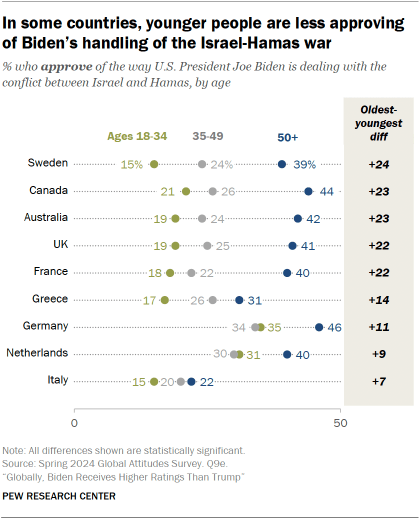
In Australia, Canada and most European countries surveyed, adults under 35 are less likely than those ages 50 and older to approve of Biden’s handling of the Israel-Hamas war. (In Australia and Canada younger adults are also less likely to answer to the question.)
For example, younger adults in France (18%) and the UK (19%) are roughly half as likely as older adults (40% and 41%, respectively) to rate him positively on this issue.
In Japan, South Africa, Sri Lanka and Thailand, younger adults are more likely than older ones to approve of how Biden is handling the war.
Opinions of how Biden has handled the Israel-Hamas war also differ by ideology in a subset of countries. In France, Greece, the Netherlands, Spain, Sweden and the UK – more than half of the European countries surveyed – people on the ideological right are more likely than those on the left to approve of how Biden is dealing with this issue.
Greeks are particularly divided. Only 6% of those on the left approve, compared with 38% on the right. Similar but smaller differences can also be seen in Argentina, Australia, Canada, Chile, Mexico and South Korea.




